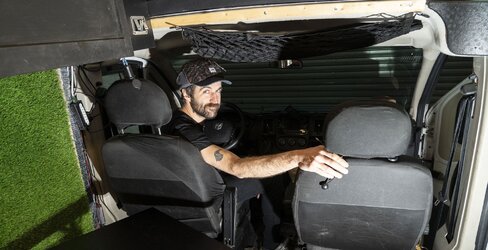
Robert Walker has been living in a van for about five years, but says he doesn’t want to do it forever.
By Kailyn Rhone | Photographs by Calla Kessler for The Wall Street Journal
March 30, 2024 5:30 am ET
Siena Juhlin bought a white Ford Transit in August and decided to make it her home. She needed a new place to live, and the idea of traveling full time in a big cargo van sounded like a fairy tale. Soon, she was off, decamping from her waitressing job in Missouri with plans to live off her savings while exploring the West Coast.
That lasted two months. In California, Juhlin’s transmission died. Ever since, she has been working three part-time jobs to regain the $5,000 she had to spend to get it fixed.
It wasn’t exactly the journey she expected—but she still prefers it to her old life as an apartment dweller. “Everything is 10 times harder,” said Juhlin, 23. “But everything is also amazingly beautiful and rewarding.”
The idea of #VanLife offers a range of promises: affordable housing, minimalist living, Instagrammable beach and mountain vistas. With rent prices high and the cost of buying a home even higher, living on wheels seems, to many, a reasonable route.
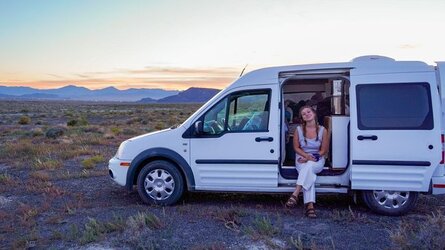
Siena Juhlin, who hit the road after a breakup, says living in a van is harder but also rewarding. PHOTO: SIENA JUHLIN
Oftentimes, it isn’t. The ups and downs of gas prices are hard to budget for, and return-to-office mandates have made roaming, for many, impossible. Finding a place to park each night is no picnic. Dating can be a stretch. And daily showers? Forget it.
John Cascarano, founder of real-estate investment and private-equity firm Blue Metric Group, said that young influencers have made the lifestyle seem more appealing than it is.
“You’re not at the Ritz-Carlton with a giant shower,” said Cascarano, whose company invests in RV parks. Most of its customers are baby boomers.
It is difficult to calculate exactly how many van lifers are traversing America’s highways and byways. Vanlife Trader, an online marketplace for buying and selling camper vans, said its revenue doubled in 2023. An app that helps travelers find places to park, iOverlander, said its number of monthly active users is up 15% from a year ago.
MBO Partners, which provides support services to self-employed workers, estimated that there were 2.9 million Americans living in their vans at least part of the time last year, down 6% from the year before. MBO based its calculations on an online survey; most respondents said they also lived in a house or apartment some of the time.
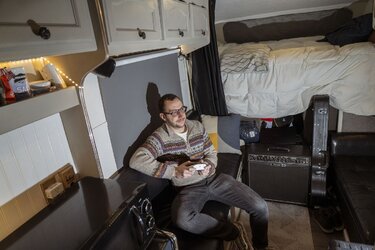
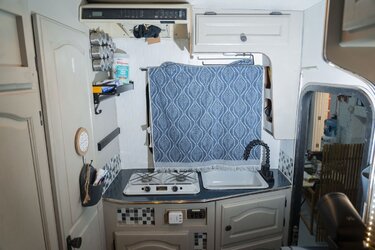
Caleb Smith parks his home in Brooklyn, N.Y. On the right, his kitchen setup.
Those who stick with this lifestyle say saving money is a big part of the appeal. Caleb Smith, 29, lives in the trendy Park Slope neighborhood of Brooklyn, N.Y.—for $460 a month. He parks his home, an Isuzu Outback Express cargo van, in a driveway between two brownstones with 24-hour surveillance cameras.
Fueling the dream
Smith is something of a van proselytizer. He used to be a homeowner in Kansas, planning a career as an engineer. Now he sleeps in his back seat and works as a systems specialist for a company in New York, Brooklyn Campervans, that sells camper vans and outfits other vans to make them suitable for living.Last summer—Smith’s first living in a van—a record-breaking heat wave made it impossible to sleep at night. He spent $120 getting a window-unit AC so that the same thing won’t happen again this summer. An extension cord can plug into a nearby building.

Emilie Hofferber has lived out of her van for two years. PHOTO: ERIC KERR
“I love my spot right now,” Smith said, “so I’m gonna stay there as long as I can.”
Emilie Hofferber has been living out of her van for two years, rambling throughout the U.S., and has no plans to stop. But choosing each day how far to drive, when to get a hotel, and whether a particular truck stop feels safe for sleeping over can get exhausting.
“You’re just always having to make big choices and think about all the tiny things you need for survival,” said Hofferber, a 28-year-old freelance photographer.
Fortress on wheels
Smith’s friend and colleague, Robert Walker, has been living in his Ram ProMaster van for about five years, a journey he started after a bout with colon cancer made him want to travel.“Cancer for me was, like, ‘What if I died from this,’” said Walker, now 35 and working as a freelance contractor for Brooklyn Campervans. “I haven’t been anywhere, so the idea of having the van, even if it was just driving upstate to go see a waterfall…it was the best of both worlds.”
Walker recently sold the Ram ProMaster and bought a new Ford E-350 cargo van. He parks each night on the street in Williamsburg, but finding a space can be hard. And despite the recent upgrade, he would like to eventually own a home with a more permanent foundation.
“It’s not like I want to live in a van forever,” he said.
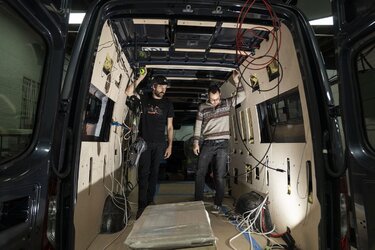

Robert Walker and Caleb Smith work on a van at Brooklyn Campervans.
Source (Archive)
